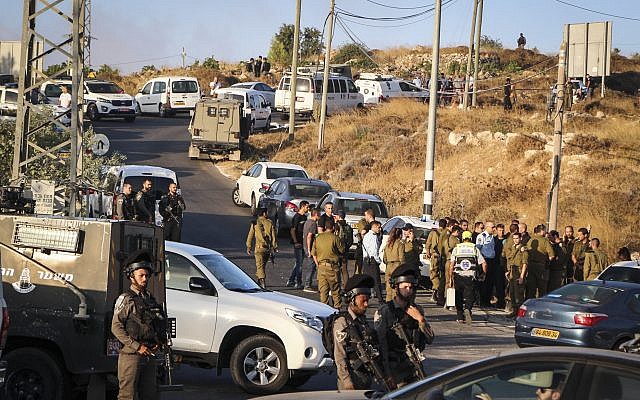An Israeli military court on Thursday convicted a Palestinian man of being involved in the killing of an Israeli teenager in 2019.
Dvir Sorek, 18, was stabbed to death near the West Bank settlement of Migdal Oz in August 2019. He was a yeshiva student enrolled in a program known as hesder that combines Torah study with military service, but was not in the military at the time of his killing.
Mahmoud Atouna is accused of being part of a five-man Hamas cell that grabbed Sorek as he got off a bus and killed him, leaving his body at the side of the road.
The court accepted the prosecution’s position that Atouna was guilty of the attack, although he was not present at the time of the stabbing.
Atouna was convicted Thursday of intentionally causing the death of Sorek. The charge is equivalent to murder in the West Bank military court.
He was additionally convicted of two charges of attempted murder and several other security offenses, according to the Israel Defense Forces.
One of the suspects in the murder of Dvir Sorek after being arrested by the Border Police and IDF in the West Bank on August 10, 2019. (Israel Defense Forces)
While not present at the scene during the stabbing, Atouna was accused by the IDF of having a “central role in the decision to carry out the attack” and recruiting one of the perpetrators.
Atouna’s sentencing trial is slated to begin on November 27.
In December 2021, the two perpetrators, Qassem Asafra and Nasir Asafra were sentenced to life imprisonment for the attack. Qassem Asafra was handed an additional 40-year sentence, and Nasir Asafra an additional 20 years. Qassem Asafra was also convicted of an attempt to kill two Israelis in a 2011 terror attack in Beersheba, for which he had not been caught at the time.

Qassem Asafra (left) and Nasir Asafra. (Social media)
The pair are cousins; it’s unclear how they are related to Ahmad Asafra, the alleged leader of the cell.
Ahmad Asafra, while not present at the scene, was sentenced to life and an additional 25 years, and ordered to pay NIS 1.5 million ($450,000) to the family of Sorek.
Another member of the cell, Yusef Zohar, was also not present during the attack, but was convicted of a number of security offenses and sentenced to life imprisonment plus 15 years.

Israeli security forces at the scene where the body of an off-duty, out-of-uniform Israeli soldier was found dead with stab wounds, near the settlement of Migdal Oz in the Etzion region, on August 8, 2019. (Gershon Elinson/Flash90)
Sorek’s body was found on a road leading to the religious seminary where he was studying.
The attackers fled the scene but were apprehended in the town of Beit Kahlil after a 48-hour manhunt.
The attackers told investigators they killed Sorek due to “the suffering of the Palestinian people” and “the situation at Al-Aqsa [Mosque],” according to transcripts of their interrogation obtained by the Yedioth Ahronoth newspaper.
They planned the murder ahead of time, drove to an intersection and waited for an Israeli, they said.
Nasir Asafra attacked Sorek after he got off a bus, first attempting to subdue him with a stun gun, then repeatedly stabbing him in the chest, he said.
“He tried to defend himself by covering his face and upper body with his hands. Then he remained still and didn’t move and I got into the car,” the attacker told investigators.
In November 2019, the IDF razed the homes of four members of the cell. In May 2020, the High Court struck down the military’s intention of demolishing Atouna’s home, ruling that his family did not support his actions and razing their home would have no deterrent effect.

